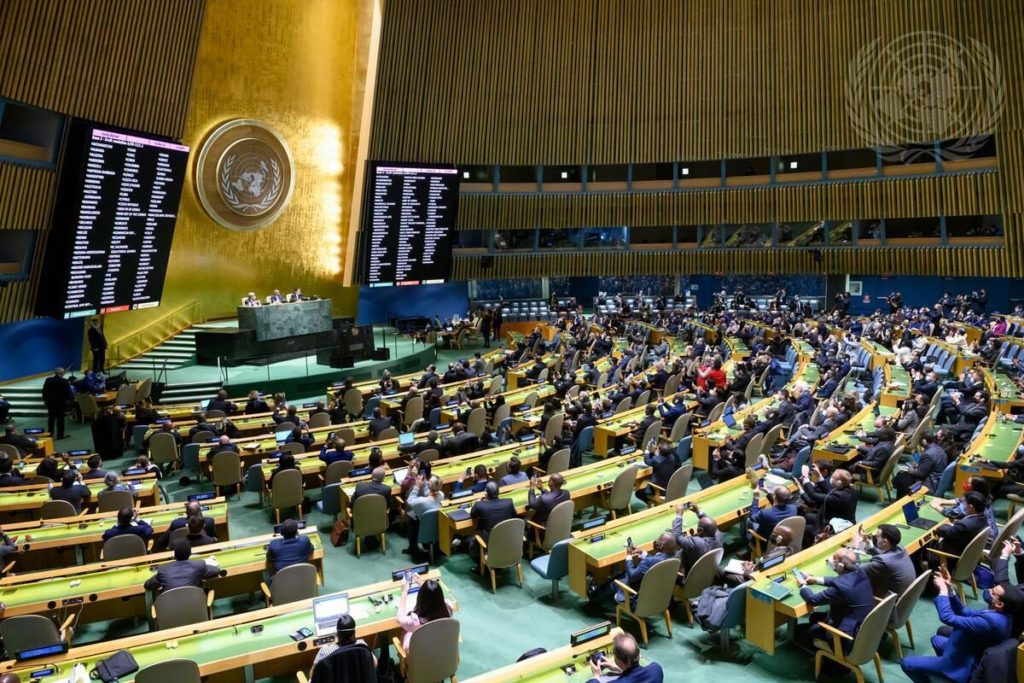New York, April 7 – The United Nations General Assembly voted 93 against 24 to suspend Russia’s membership in the 47-nation UN Human Rights Council, a decision prompted by the discovery of hundreds of corpses in Bucha, a city on the outskirts of the Ukrainian capital of Kiyv. The US, Ukraine and other countries assigned the gruesome deaths to Russia. A total of 58 countries abstained.
The US and more than 30 countries submitted a resolution entitled ‘Suspension of the rights of membership of the Russian Federation in the Human Rights Council” from the Geneva-based council. The 193-nation assembly’s decision to approve the resolution was the first concrete action against Russia since its February 24 military invasion of Ukraine.
The countries voting against the resolution are: Algeria, Belarus, Burundi, Central Africa Republic, China, Congo, Cuba, North Korea, Eritrea, Ethiopia, Gabon, Iran, Kazakhstan, Kyrgyzstan, Laos, Mali, Nicaragua, Russia, Syria, Tajikistan, Uzbekistan, Viet Nam, Zimbabwe.
Previous attempts by the US and allies to stop the war by a decision in the UN Security Council failed because Russia, one of the five permanent veto-wielding countries, blocked a resolution condemning the invasion of Ukraine. The other members are the US, France, the United Kingdom and China.
The permanent members have veto power in the 15-nation council, which has authority over issues of peace and security around the world. But they cannot use the veto in the assembly.
The request to hold the assembly session was signed by representatives of Antigua and Barbuda, Canada, Colombia, Costa Rica, Georgia, Japan, Liberia, Republic of Moldova, Ukraine, the United Kingdom, United States and the Head of the Delegation of the European Union, on behalf of 27 members of the European Union, said General Assembly’s spokesperson Paulina Kubiak.
She said the draft resolution is co-sponsored by Ukraine, Antigua and Barbuda, Canada, Colombia, Czech Republic, Estonia, France, Georgia, Germany, Italy, Japan, Latvia, Liberia, Lithuania, Luxembourg, Poland, Republic of Moldova, the United Kingdom and United States.
The assembly is responsible for electing members of the UN Human Rights Council and the only time it suspended a member was Libya in 2011. Russia is serving a 3-year term ending in December 2023.
The UN has been strongly criticized for failing to stop the war, particularly by the Ukrainian government.
Ukrainian President Volodymyr Zelenskyy, who addressed the council for the first time on April 5 via video, challenged the body to take action against Russia or dissolve itself.
“Either remove Russia as an aggressor and a source of war so it cannot block decisions about its own aggression, its own war, and then do everything that we can do to establish peace,” he said. “Or the other option is, please show how we can reform or change, dissolve yourself and work for peace.”
Zelenskyy emphasized that “Ukraine needs peace, Europe needs peace, and the world needs peace”
The US ambassador to the UN, Linda Thomas-Greenfield, told the same council meeting on the war in Ukraine on April 5 that her government with the backing from some other countries were seeking to expel Russia from the Human Rights Council because Russia has been using the platform to counter criticisms against the war. At the meeting, council members were shown videos and photos of corpses in the streets of Bucha, the city near Kyiv.
“Russia’s participation on the Human Rights Council hurts the council’s credibility,” Thomas-Greenfield said. “It undermines the entire UN and it is just plain wrong.”
“Given the growing mountain of evidence, Russia should not have a position of authority in a body whose purpose, whose very purpose, is to promote respect for human rights. Not only is it the height of hypocrisy — it is dangerous,” she said. “Russia is using its membership on the Human Rights Council as a platform for propaganda to suggest Russia has a legitimate concern for human rights.”
Current members of the UN Human Rights Council:
(2022-2024 term) Benin, Cameroon, Eritrea, Gambia, Somalia, India, Kazakhstan, Malaysia, Qatar, United Arab Emirates, Lithuania, Montenegro, Argentina, Honduras, Paraguay, Finland, Luxembourg, the United States,
(2021–2023 term) Côte d’Ivoire, Gabon, Malawi, Senegal, China, Nepal, Pakistan, Uzbekistan, Russia, Ukraine, Bolivia, Cuba, Mexico, France, United Kingdom
(2020–2022 term) Libya, Mauritania, Sudan, Namibia, Indonesia, Japan, Marshall Islands, South Korea, Armenia, Poland, Brazil, Venezuela, Germany, Netherlands
United Nations correspondent journalists – United Nations correspondent journalists – United Nations correspondent journalists
United Nations journalism articles – United Nations journalism articles – United Nations journalism articles

